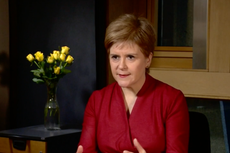The Independent's journalism is supported by our readers. When you purchase through links on our site, we may earn commission.
Whatever the results of Scotland’s May election, the SNP must prepare for life after Nicola Sturgeon
It’s no secret that the first minister has begun thinking about her future away from Holyrood. But her exit from the Scottish political stage would leave her party facing huge strategic challenges

A prediction: after 2021, Nicola Sturgeon won’t fight another devolved Scottish election as SNP leader. The first minister’s future hinges on the outcome of next May’s crucial Holyrood vote and the UK government’s response to nationalist demands for a second independence referendum.
If the SNP manages to secure and then win that referendum, Scots will go on to elect a sovereign, independent parliament, most likely with Sturgeon at its helm. If the nationalists lose, however, Sturgeon will have little choice but to resign, much as Alex Salmond and David Cameron did following their respective referendum defeats in 2014 and 2016.
An alternative scenario would see Boris Johnson block “IndyRef2” for an extended period of time, regardless of how extensive the SNP’s electoral victory is this spring. (Polls suggest it will be very extensive.) But even then, Sturgeon isn’t going to stick around indefinitely.
Sturgeon has run Holyrood in some capacity since 2007 – for nearly a decade and a half – and it’s no secret that the 50-year-old has begun thinking about life beyond the limits of the Edinburgh parliament. “While I’m not planning for it to be imminent, whenever I do stop being first minister, I will still be young enough to do other things,” she told an interviewer over the summer. “And I find that quite uplifting.”
The findings of the ongoing (and potentially explosive) Salmond inquiry notwithstanding, the expectation among her colleagues is that she will serve the bulk of another term in Bute House before handing over to a successor sometime in the mid-2020s. “She knows she has a political shelf-life,” one senior nationalist told me early on in Sturgeon’s first ministerial tenure. “She’s a realist. She won’t go on forever.”
Sturgeon’s exit from the Scottish political stage would leave the SNP facing huge strategic challenges. Despite the party’s commanding lead in the polls, the first minister’s overarching political project – which combines tight bureaucratic control of the independence movement with an incremental approach to legislative reform – is beginning to flag, at least internally.
Last week, at the SNP’s (virtual) annual conference, a slate of anti-establishment candidates were elected to the party’s National Executive Committee, including the Edinburgh MP Joanna Cherry, a prominent outrider for grassroots opposition to Sturgeon, and several other activists linked to the left-wing campaign group, Common Weal.
The NEC results were the strongest indication yet that a significant chunk of the nationalist base has lost patience with Sturgeon’s gradualism and wants the SNP to adopt more radical positions on a host of key issues, from the monetary economics of independence to climate change and a Green New Deal.

A number of high-profile SNP politicians have been mooted as potential replacements for Sturgeon. The Scottish justice secretary Humza Yousaf, the 30-year-old finance secretary Kate Forbes, and the influential former deputy leader Angus Robertson (who strenuously denies having any interest in the post) are all thought to be somewhere in the mix. Cherry, too, is believed to be weighing up her leadership options, although her adversarial rhetoric on trans rights and embrace of the social media culture war may complicate any future pitch for the job.
The next SNP leader will have to reckon with the good and the bad of Sturgeon’s legacy. More than Donald Dewar and Alex Salmond, Sturgeon is the dominant political figure of the devolutionary era. She has steered Scotland through Brexit and Covid-19 and now looks set to deliver a second SNP majority at Holyrood, followed, perhaps, by another referendum on the break up of Britain.
And yet, for a professed social democrat, she has also been remarkably centralising and conservative; far too deferential to private sector interests and reluctant to push for lasting economic change.
Sturgeon assumed control of the SNP in November 2014, in the aftermath of Salmond’s post-referendum resignation. Since then, she has shaped every aspect of Scottish national life. With another pivotal election looming and support for independence inching towards the 60 per cent mark, she remains very much in charge today. Still, the end point of her career may just be creeping into sight. Her party, and Scotland, should plan accordingly.
Jamie Maxwell is a Glasgow-based political journalist
Join our commenting forum
Join thought-provoking conversations, follow other Independent readers and see their replies
Comments


Bookmark popover
Removed from bookmarks